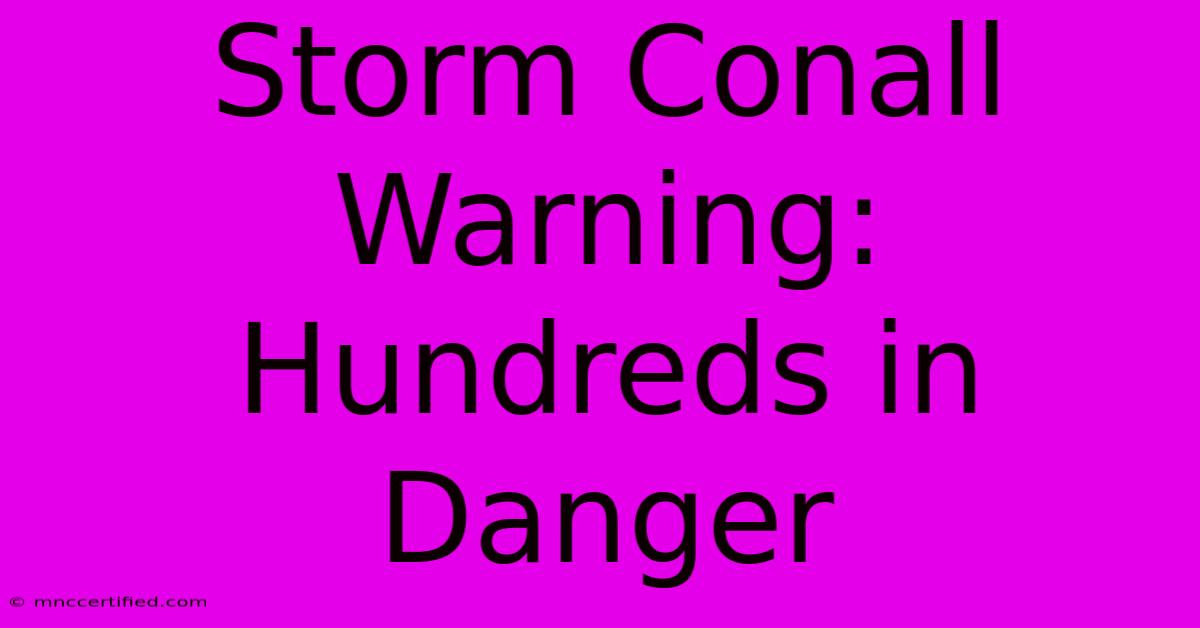Storm Conall Warning: Hundreds In Danger

Table of Contents
Storm Conall Warning: Hundreds in Danger
Urgent evacuations underway as powerful Storm Conall batters coastal communities.
The ferocious Storm Conall is unleashing its fury on coastal regions, leaving hundreds in immediate danger. High winds, torrential rain, and devastating storm surges are causing widespread destruction and prompting urgent evacuation orders. Authorities are scrambling to assist those affected, but the severity of the storm is creating significant challenges.
The Severity of Storm Conall
Storm Conall, classified as a Category 2 cyclone (or equivalent depending on regional classification), is packing winds exceeding 100 mph (160 km/h). This extreme weather event is causing significant damage to infrastructure, including widespread power outages, flooding, and damage to buildings. Coastal areas are bearing the brunt of the storm's impact, with massive waves crashing against seawalls and submerging low-lying areas.
Impact on Coastal Communities
The impact on coastal communities is catastrophic. Hundreds of homes have been damaged or destroyed, leaving many residents displaced and in need of emergency shelter. Rescue teams are working tirelessly to reach those trapped in flooded homes and assist with evacuations. The scale of the devastation is immense, with roads blocked by debris and communication lines disrupted.
- Flooding: Extensive flooding is reported in several coastal towns, rendering many areas inaccessible.
- Power Outages: Thousands are without power, leaving many vulnerable in the harsh conditions.
- Damage to Infrastructure: Roads, bridges, and other critical infrastructure have suffered significant damage, hindering rescue efforts.
- Casualties: While the full extent of casualties is still being assessed, reports indicate injuries and sadly, some fatalities.
Emergency Response and Evacuation Efforts
Authorities have issued urgent evacuation orders for several coastal areas, urging residents to seek higher ground or designated shelters. Emergency services are working around the clock to provide aid, but the challenging weather conditions are making rescue operations incredibly difficult. The military has been deployed to assist with evacuations and disaster relief efforts.
Seeking Shelter and Safety
If you are in an affected area, please heed all official warnings and evacuation orders. Find shelter immediately in a designated evacuation center or a sturdy building away from coastal areas. Stay informed about the storm's progress through official channels and avoid unnecessary travel.
Long-Term Impact and Recovery
The aftermath of Storm Conall will require a significant and prolonged recovery effort. The extent of the damage to infrastructure, homes, and businesses is likely to cause considerable economic disruption. Long-term recovery efforts will include rebuilding infrastructure, providing aid to displaced residents, and addressing the long-term psychological impact on affected communities. The government has pledged substantial financial support to aid in the recovery process.
Staying Informed and Supporting Relief Efforts
Stay informed about the latest developments through reputable news sources and official government websites. If you are able to assist with relief efforts, consider donating to reputable charities working on the ground to provide aid to those affected by Storm Conall.
Keywords: Storm Conall, Cyclone Conall, Hurricane Conall (adapt to regional terminology), coastal storm, severe weather, emergency, evacuation, flooding, power outage, damage, rescue, relief efforts, recovery, disaster relief, donations, weather warning, high winds, storm surge, casualties, impacted communities
Note: This article is intended for informational purposes only and does not constitute official advice. Always refer to official sources for the most up-to-date information and instructions. Remember to adapt the keywords to your specific target region and news sources. For example, if this storm hits the UK, use UK-specific news outlets and terminology. If it hits the US, adapt to US terminology (hurricane vs cyclone).

Thank you for visiting our website wich cover about Storm Conall Warning: Hundreds In Danger. We hope the information provided has been useful to you. Feel free to contact us if you have any questions or need further assistance. See you next time and dont miss to bookmark.
Featured Posts
-
Family Claims Father Was Db Hijacker
Nov 28, 2024
-
Mishal Husains Bbc Departure Confirmed
Nov 28, 2024
-
Rooney Blasts Derby Performance
Nov 28, 2024
-
Volleyball Team Bonding Ideas
Nov 28, 2024
-
Tim Walter Sacked By Hull City Football Club
Nov 28, 2024